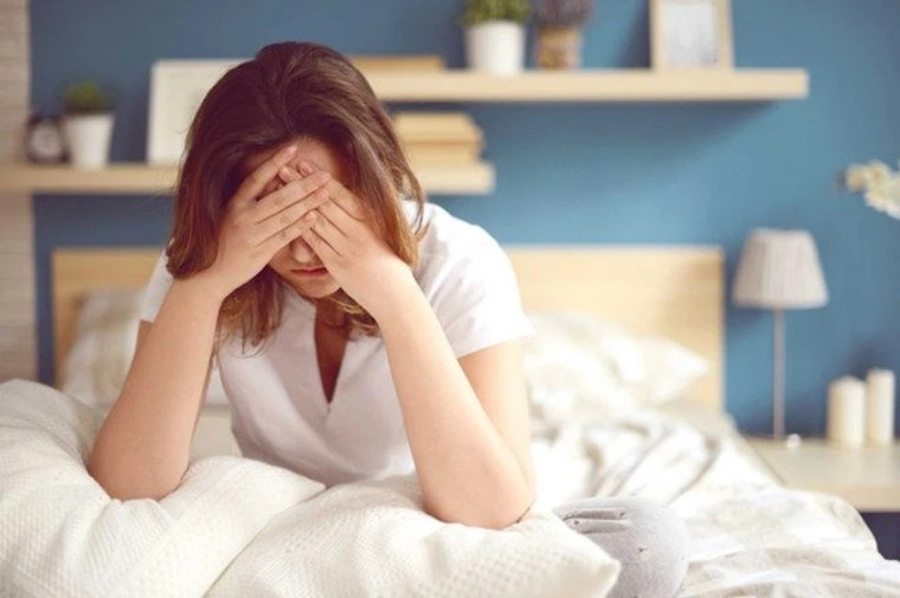Here are the three types of sleep that can bring bad luck, according to ancient wisdom:
1. Slothful Sleep
Many people tend to stay up very late on weekends or holidays, only to sleep in until noon the next day. This is what ancient wisdom refers to as slothful sleep.
In Traditional Chinese Medicine, it is believed that lying down for extended periods can deplete your vital energy and harm your health. The early morning hours are when the body produces the most robust yang energy. Sleeping in causes an imbalance, affecting your physical well-being.
For students and employees who usually maintain a disciplined sleep schedule, sleeping in on holidays can lead to a sense of laziness and inertia. This is because the sudden change in your body’s circadian rhythm stimulates the brain, disrupting hormone balance. As a result, you may feel irritable, uncomfortable, and prone to anger when you finally wake up, with a dizzy, aching head.
Sleeping in also means that your muscles and heart remain relaxed for an extended period, hindering the timely elimination of toxins from the body. Consequently, you may experience a feeling of weakness and numbness in your limbs upon waking.
Furthermore, this type of sleep can cause you to miss the optimal time for a nutritious breakfast, leading to overeating at lunch. Over time, this can damage the function of the intestines and result in chronic stomach inflammation and digestive disorders.

Sleeping in also increases the risk of obesity, cancer, and diabetes. (Illustrative image)
Therefore, the wise advice from ancient times suggests early sleeping and early rising, with a balanced work and rest routine. The golden hours for a good night’s sleep are between 11 PM and 6 AM. If you’re exceptionally tired, it’s permissible to wake up a little later, but ideally before 8 AM.
2. Sleep of Vexation
In today’s fast-paced world, relationships can be complex, and emotions can run high. Many people, when angry, turn to sleep as a means of calming down. However, this sleep of vexation, as ancient wisdom calls it, doesn’t truly soothe negative emotions as one might think.
On the contrary, falling asleep while angry can engrave those unpleasant memories more deeply into your mind. Additionally, when you’re angry, your nervous system is stimulated, making it difficult to fall asleep peacefully. Even if you do manage to sleep, you may experience restless sleep filled with vivid dreams.
Some people have a habit of pulling the covers over their heads when they’re angry and frustrated. This reduces the intake of oxygen to the brain, while carbon dioxide can build up under the covers, leading to inefficient metabolic processes. As a result, you may wake up with red, swollen eyes and a body that feels utterly exhausted. If this becomes a regular occurrence, it can lead to further issues such as insomnia, loss of appetite, and low mood.
For those with high blood pressure or cardiovascular issues, it’s especially important to avoid sleeping while upset. Doing so increases the risk of neurological problems and heart pain.
To ensure a healthy body and mind, it’s best to address negative emotions before sleep. Share your feelings with loved ones, confide in a close friend, write in a journal, or go for a walk to clear your head and breathe fresh air…
3. Postprandial Sleep
There’s a saying in folk wisdom, “Stretch the skin of the stomach, and the skin of the eyes will relax,” referring to the drowsiness that follows a big meal.
When we eat, blood rushes to the stomach to aid digestion, reducing blood flow to the brain and other organs. This shift in blood distribution can make us feel tired and sleepy.
However, sleeping immediately after a meal can be harmful to your stomach. As we sleep, digestion slows down, and any undigested food left in the stomach can cause excess burden, leading to stomach ulcers or inflammation over time.
While it’s challenging to avoid post-meal drowsiness entirely, there are ways to mitigate it. Eating smaller meals, avoiding overeating, and drinking peppermint tea about half an hour after a meal can help you stay alert. The refreshing taste of peppermint can also aid digestion. Alternatively, you can try walking around to redistribute energy throughout your body…
In the evening, it’s best to avoid eating anything within three hours of bedtime, no matter how tempting it may be. If you’ve had a tiring day and didn’t sleep well the night before, a 30-minute nap during the day can help reduce fatigue.



































